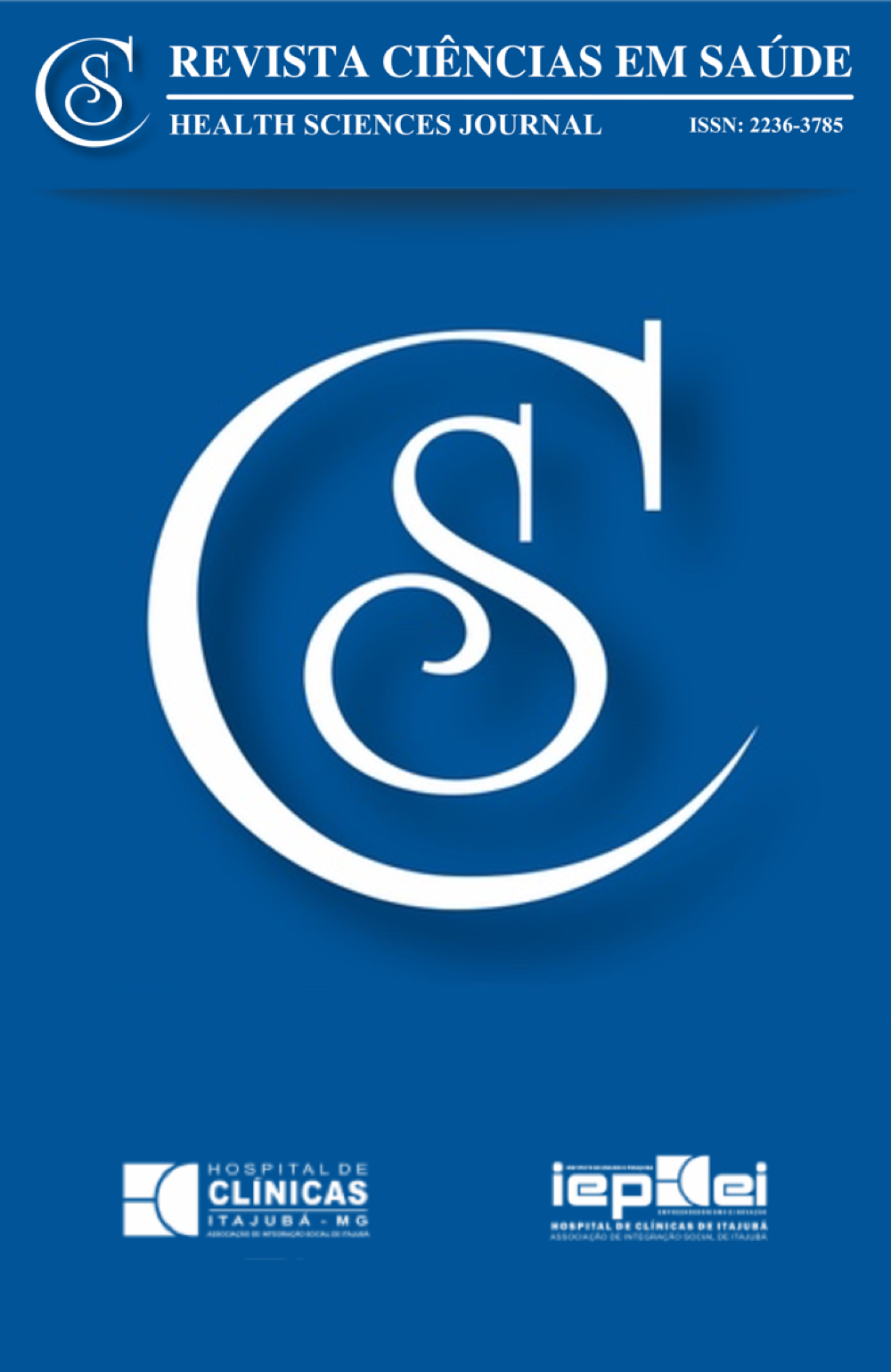Factors associated with transcendental meditation practice in older people
Main Article Content
Abstract
Objective: To evaluate factors associated with the practice of transcendental meditation (TM) in the elderly. Methods: Cross-sectional study, with the inclusion of 113 older adults and women, 60 of them practitioners and 53 non-MT practitioners. A semi-structured questionnaire was used as an instrument, composed of sociodemographic, health and TM practice data. Data analysis was performed using the chi-square test and binary logistic regression. Results: The average age of practitioners was lower than that of non-practitioners (63.7 ± 4.0 vs. 69.1 ± 6.6 years). Most of the sample had completed higher education (f = 45; 75%; p = 0.001) and received more than three minimum wages (f = 40; 67.8%; p = 0.001). In the group of TM practitioners there was a greater proportion of individuals with excellent / good self-perceived health (91.7% vs 77.4%; p = 0.034), and less hospitalization in the last semester (5% vs 24.5 %; p = 0.003). Older adults who denied hospitalization or the presence of diabetes mellitus (DM) presented, respectively, 5.7 (95% CI OR 1.1 - 28.9) and 4.9 (95% CI OR 1.3 - 19.2) times chance to practice MT. The practice of TM is 80% more likely to be practiced by older adults with better self-perceived health (OR 0.17; 95% CI 0.03 - 0.96). Conclusion: The practice of a holistic activity such as TM is associated with better self-perceived health than older adults of the same age, and less chance of hospitalization in the last semester and the presence of DM.
Article Details
Authors maintain copyright and grant the HSJ the right to first publication. From 2024, the publications wiil be licensed under Attribution 4.0 International 
 , allowing their sharing, recognizing the authorship and initial publication in this journal.
, allowing their sharing, recognizing the authorship and initial publication in this journal.
Authors are authorized to assume additional contracts separately for the non-exclusive distribution of the version of the work published in this journal (e.g., publishing in an institutional repository or as a book chapter), with acknowledgment of authorship and initial publication in this journal.
Authors are encouraged to publish and distribute their work online (e.g., in institutional repositories or on their personal page) at any point after the editorial process.
Also, the AUTHOR is informed and consents that the HSJ can incorporate his article into existing or future scientific databases and indexers, under the conditions defined by the latter at all times, which will involve, at least, the possibility that the holders of these databases can perform the following actions on the article.
References
Lima MP, Oliveira AL, Godinho P. Promover o bem-estar de idosos institucionalizados: Um estudo exploratório com treino em mindfulness. Rev Port Pedag. 2011;45(1):165-83. doi: 10.14195/1647-8614_45-1_9
Koike MK, Cardoso R. Meditation can produce beneficial effects to prevent cardiovascular disease. Horm Mol Biol Clin Investig. 2014;18(3):137-43. doi: 10.1515/hmbci-2013-0056
Hartley L, Mavrodaris A, Flowers N, Ernst E, Rees K. Transcendental meditation for the primary prevention of cardiovascular disease. Cochrane Database Syst Rev. 2014;(12):CD010359. doi: 10.1002/14651858.cd010359.pub2
Chételat G, Lutz A, Arenaza-Urquijo E, Collette F, Klimecki O, Marchant N. Why could meditation practice help promote mental health and well-being in aging? Alzheimers Res Ther. 2018;10(1):57. doi: 10.1186/s13195-018-0388-5
Poisnel G, Arenaza-Urquijo E, Collette F, Klimecki OM, Marchant NL, Wirth M, et al. The Age-Well randomized controlled trial of the Medit-Ageing European project: Effect of meditation or foreign language training on brain and mental health in older adults. Alzheimers Dement (N Y). 2018;4:714-23. doi: 10.1016%2Fj.trci.2018.10.011
Folstein MF, Folstein SE, McHugh PR. "Mini-mental state". A practical method for grading the cognitive state of patients for the clinician. J Psychiatr Res. 1975;12(3):189-98. doi: 10.1016/0022-3956(75)90026-6
Brucki S, Nitrini R, Caramelli P, Bertolucci PHF, Okamoto IH. Sugestões para o uso do mini-exame do estado mental no Brasil. Arq. Neuro-Psiquiatr [Internet]. 2003;61(3B):777-81. doi: 10.1590/S0004-282X2003000500014
Faul F, Erdfelder E, Lang AG, Buchner A. G*Power 3: a flexible statistical power analysis program for the social, behavioral, and biomedical sciences. Behav Res Methods. 2007;39(2):175-91. doi: 10.3758/bf03193146
Moraes EM. Atenção à Saúde do Idoso: Aspectos Conceituais [Internet]. Brasília, DF: Organização Pan-Americana da Saúde; 2012 [cited 2020 Aug 29]. Avaiable from: www.prefeitura.sp.gov.br/cidade/secretarias/upload/saude/arquivos/pessoaidosa/AtencaoSaudeIdoso-AspectosConceituais.pdf.
Casado EA, Paz LMS, Silva RP, Souza ARM, Silva HLA, Pereira KD, et al. (2017). Educação em saúde como ferramenta de prevenção da doença de Alzheimer: um relato com idosos ativos. Cad Educ Sau Fisiot [Internet]. 2017;4(8 suppl):100. Avaiable from: revista.redeunida.org.br/ojs/index.php/cadernos-educacao-saude-fisioter/issue/download/32/pdf_32
Ooi SL, Giovino M, Pak SC. Transcendental meditation for lowering blood pressure: An overview of systematic reviews and meta-analyses. Complement Ther Med. 2017;34:26-34. doi: 10.1016/j.ctim.2017.07.008
Wahbeh H, Sagher A, Back W, Pundhir P, Travis F. A Systematic Review of Transcendent States Across Meditation and Contemplative Traditions. Explore (NY). 2018;14(1):19-35. doi: 10.1016/j.explore.2017.07.007
Mahone MC, Travis F, Gevirtz R, Hubbard D. fMRI during Transcendental Meditation practice. Brain Cogn. 2018;123:30-3. doi: 10.1016/j.bandc.2018.02.011
Elder C, Nidich S, Moriarty F, Nidich R. Effect of transcendental meditation on employee stress, depression, and burnout: a randomized controlled study. Perm J. 2014;18(1):19-23. doi: 10.7812%2FTPP%2F13-102
Dos Santos L, Cyrino ES, Antunes M, Santos DA, Sardinha LB. Changes in phase angle and body composition induced by resistance training in older women. Eur J Clin Nutr. 2016;70(12):1408-13. doi: 10.1038/ejcn.2016.124
Ribeiro AS, Tomeleri CM, Souza MF, et al. Effect of resistance training on C-reactive protein, blood glucose and lipid profile in older women with differing levels of RT experience. Age (Dordr). 2015;37(6):109. doi: 10.1007/s11357-015-9849-y
van Alphen HJ, Hortobágyi T, van Heuvelen MJ. Barriers, motivators, and facilitators of physical activity in dementia patients: A systematic review. Arch Gerontol Geriatr. 2016;66:109-18. doi: 10.1016/j.archger.2016.05.008
Torquato E, Gerage A, Meurer S, Borges R, Silva M, Benedetti T. Comparação do nível de atividade física medido por acelerômetro e questionário IPAQ em idosos. Rev Bras Ativ Fís Saúde 2016;21(2):144-53. doi: 10.12820/rbafs.v.21n2p144-153
